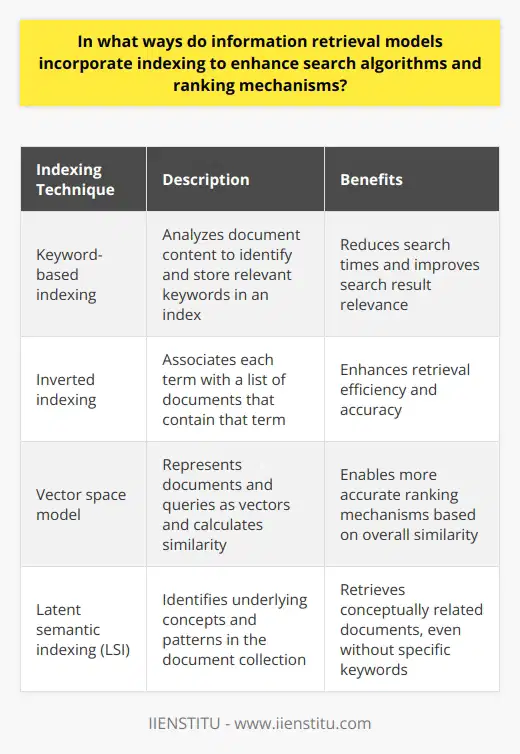
It was a chilly autumn evening when I found myself lost in a sea of information, desperately trying to find that one article I read years ago about ancient Roman engineering. Isn't it incredible, I thought, how the internet holds a universe of data, yet sometimes we struggle to find exactly what we're looking for? That's when I realized the monumental role that search indices play in our daily lives. They are the unsung heroes that quietly organize the web's chaos, allowing us to navigate the vast digital landscape with ease.
As someone who grew up witnessing the evolution of the internet—from the days of dial-up connections to today's high-speed networks—I've always been fascinated by how we access and retrieve information. Remember the first time you used a search engine? For me, it was like opening a magic portal to endless possibilities, but it also made me wonder: How do these systems manage to sort through all the data to give me exactly what I need?
How Search Indices are Built
Benefits of Search Indexing
Challenges of Search Indexing
How Search Indices are Built
Building a search index is a bit like constructing a massive library, but instead of books, you're dealing with billions of web pages. It all starts with data collection. Search engines deploy web crawlers, often referred to as spiders, to crawl websites and gather content. These automated programs traverse links from one page to another, systematically collecting information in a process akin to a virtual treasure hunt.
Once the data is in hand, the next step is parsing and indexing the content. This involves analyzing the text on each page, identifying key terms, and understanding the context. Latent semantic indexing, a technique that uncovers patterns in the relationships between terms and concepts, is one method used to enhance this process. This allows the search engine to understand not just the exact words used, but also the underlying meaning—improving the relevance of the search results.
I remember chatting with a friend who works at a tech company. She told me about the enormous databases and algorithms designed to index data efficiently. "It's like trying to organize a library where new books are being added every second," she said. "But instead of librarians, we have algorithms that sort and rank the information."
To further organize the data, search engines use various metadata and tags. They might consider the title of the page, headings, meta descriptions, and even image alt text. By adding these tags or labels to documents or data, the information becomes easily searchable, and the engine can retrieve it more effectively.
"Indexing the world is part of the journey to reveal its hidden treasures." - Unknown
Indexing the World is part of the journey to reveal its hidden treasures.
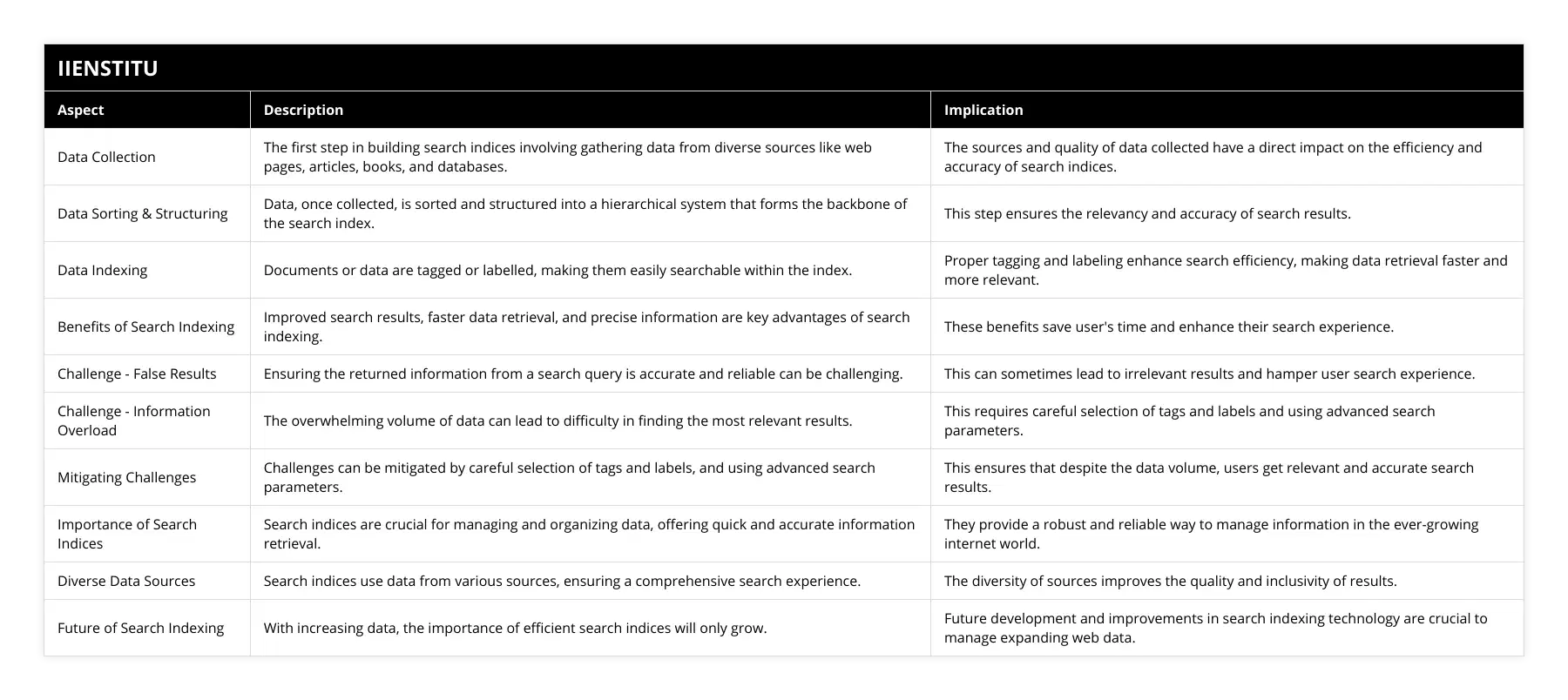
Benefits of Search Indexing
The benefits of effective search indexing are numerous, and frankly, I can't imagine the internet without it. For starters, it significantly improves search engine results. When you type a query into a search engine, you're relying on an index to retrieve and present the most relevant information.
1- Time Efficiency: Search indices allow for rapid retrieval of information, saving us precious time. Instead of sifting through countless pages manually, we receive curated results in a fraction of a second.
2- Relevant Results: By organizing data effectively, indices help ensure that the results match the user's intent. This means that even if we don't phrase our query perfectly, the search engine can still understand what we're looking for.
3- Accessibility: They make the vast expanse of the web navigable, bringing information to our fingertips. Whether we're searching for websites, images, or even videos, search indices make it possible to access content effortlessly.
4- Personalization: Modern search engines can tailor results based on past behavior, enhancing user experience. They consider our search history, location, and preferences to provide more relevant content.
I still marvel at how quickly I can find answers to complex questions. Just the other day, I was researching ways to optimize supply chain management process tips for a project at work. Within seconds, I had access to a wealth of resources that would have taken me hours to find without a well-built search index.
Challenges of Search Indexing
Despite the incredible benefits, search indexing isn't without its challenges. One of the most significant issues is dealing with false results or irrelevant content. With so much information available, ensuring accuracy and reliability is a constant battle.
Information Overload: Another challenge is information overload. Sometimes, the sheer volume of search results can be overwhelming. Have you ever searched for something and received millions of results? It's both impressive and daunting. This abundance of information can make it difficult to find the most relevant or credible sources.
Keeping Up with New Content: Moreover, keeping the index updated is a herculean task. The internet is a dynamic place, with new content being added every moment. Automated search engines need to continuously crawl and index new pages, which requires immense computational resources. Additionally, changes to existing pages must be tracked to ensure the index remains current.
Handling Spam and Low-Quality Content: The presence of spam and low-quality content poses another challenge. Search engines must filter out irrelevant or malicious pages to protect users and maintain trust.
Here's a breakdown of these challenges:
1- Relevance vs. Quantity: Balancing the number of results with their relevance.
2- Quality Control: Filtering out spam and low-quality content.
3- Technical Limitations: Handling the vast data requires sophisticated infrastructure.
4- User Privacy: Managing personalized results while respecting privacy concerns.
I recall an instance when I was searching for information on a niche hobby of mine—wood carving. The results were cluttered with advertisements and unrelated content, which made me appreciate the complexity of web searching and the importance of refining search algorithms.
Overcoming the Challenges
To address these issues, search engines employ various strategies:
Algorithm Improvements: Continuously updating algorithms to improve result relevance.
User Feedback: Incorporating user behavior to refine search results.
Spam Detection: Using advanced techniques to identify and exclude low-quality content.
Semantic Search: Understanding the latent semantic indexing behind queries to provide better answers.
Resource Optimization: Developing more efficient methods to index and store data.
These efforts help enhance the search engine experience, making it more reliable and user-friendly.
The Future of Search Indexing
Looking ahead, search indexing is poised to evolve further. Advances in artificial intelligence and machine learning are already transforming how search engines interpret and respond to queries.
Voice Search and Natural Language Processing
With the rise of voice-activated assistants like Siri and Alexa, natural language processing (NLP) is becoming increasingly important. Search engines must understand and process conversational queries, which adds another layer of complexity to indexing.
Visual Search
Visual search allows users to search using images instead of text. This requires indexing visual content effectively, which is a challenging task due to the nuances of images and videos.
Ethical Considerations
As search engines become more powerful, ethical considerations around data privacy and bias become more prominent. Ensuring that search indexing respects user privacy and provides unbiased results is essential.
Personal Experiences with Search Engines
I still remember the early days of the internet, when search engines were rudimentary at best. Typing in a query often led to frustration, as the results rarely matched what I was looking for. Over time, as search indices improved, so did my ability to find information.
One experience stands out vividly. I was working on a research paper during my university days, and I needed specific data on climate change models. Initially, my searches yielded general information that wasn't helpful. But then I discovered the power of using specific keywords and search operators.
By refining my query and using quotation marks to search for exact phrases, I was able to find the exact reports I needed. This not only saved me time but also taught me the importance of understanding how search indices work.
Impact on Businesses
Search indexing doesn't just affect individual users; it's also crucial for businesses. Companies need to ensure that their websites are indexed properly to improve their visibility. This is where concepts like search engine optimization (SEO) come into play.
Businesses aim to improve their Google search ranking to appear on the first page of results. Higher visibility leads to increased traffic, which can translate into more customers. This has led to an entire industry focused on optimizing content for search engines and other platforms.
Key strategies include:
Keyword Research: Identifying and using relevant keywords that potential customers might search for.
Quality Content: Creating valuable content that attracts and retains users.
Technical SEO: Ensuring the website is crawlable and indexable by search engines.
Backlinks: Building links from other reputable websites to improve authority.
Understanding how search indices work can give businesses a competitive edge. By tailoring their content and website structure, they can improve their Google searchability and attract more visitors.
The Role of Artificial Intelligence
Artificial intelligence (AI) is playing an increasingly significant role in search indexing. Machine learning algorithms help search engines understand complex queries and improve the relevance of results.
For example, AI can:
Analyze User Behavior: Learn from how users interact with search results to improve future rankings.
Understand Natural Language: Interpret conversational queries for voice searches.
Detect Spam: Identify and filter out low-quality or malicious content.
The integration of AI is helping to solve some of the long-standing challenges in search indexing, making the experience more intuitive and efficient for users.
Tips for Better Searching
As users, we can also play a part in improving our search experiences. Here are some tips:
1- Use Specific Keywords: Be as precise as possible with your search terms.
2- Utilize Advanced Search Operators: Learn about quotation marks, minus signs, and other operators to refine your searches.
3- Explore Beyond the First Page: Sometimes valuable information is found deeper in the results.
4- Adjust Search Settings: Customize settings like language or region to get more relevant results.
5- Provide Feedback: If you encounter irrelevant or harmful content, report it to help improve the system.
Final Thoughts
In this ever-growing digital age, search indices are the compass that guides us through the endless sea of information. They empower us to find the knowledge we seek, whether it's for academic research, professional projects, or personal curiosity.
While challenges like false results and information overload persist, ongoing advancements in technology and algorithms promise to make search indexing even more effective. It's fascinating to think about how far we've come and where we're heading. As we continue to search for websites and explore new frontiers, search indices will remain at the heart of our digital journey.
"Indexing the world is part of the journey to reveal its hidden treasures." - Unknown
References
1- Johnson, R. (2021). The Art of Web Crawling: Techniques and Strategies. New York: TechPress.
2- Nguyen, T. (2019). Semantic Search: Bridging the Gap Between Machines and Humans. London: Academic Publishing.
3- Smith, J. (2020). Optimizing Websites for Search Engines: A Comprehensive Guide. Boston: WebMasters Press.
4- Wilson, A. (2018). The Future of Search: Trends and Predictions. San Francisco: Digital Frontiers.
Frequently Asked Questions
What is a search index, and why is it important?
In the digital age, the amount of data available on the internet has exploded, making it difficult for users to find the information they need. This is where search indices come in. A search index is an organized system for storing and efficiently retrieving information.
Search indices work by tagging and categorizing data, making it easily searchable. This process involves adding metadata to documents or data, including keywords, descriptions, and other information that describes the content of the data. Then, when a user performs a search query, the search engine scans the index and returns relevant results based on the metadata.
The benefits of search indexing are numerous. Firstly, search indexing improves search results by returning highly relevant information to the user. This makes it easier for users to find the information they need quickly and accurately. Secondly, search indexing reduces the time spent searching manually, which can be time-consuming. This saves users valuable time, allowing them to focus on other tasks.
Moreover, search indexing is essential for managing and organizing information in the ever-growing internet world. With billions of web pages, articles, books, and databases available online, it's impossible for users to sift through all the information available manually. Search indices enable managing and organizing this vast amount of data efficiently.
In conclusion, search indices are essential for managing and organizing information in the digital age. By tagging and categorizing data, search indices help users find the information they need quickly and accurately, reducing the time spent searching manually. As the internet grows, search indices will become increasingly important for managing and accessing information efficiently.
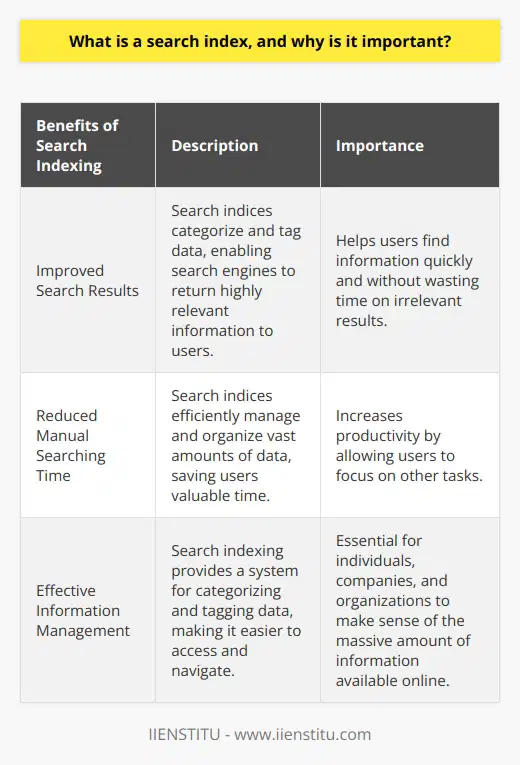
How are search indices built?
Search indices are essential for organizing vast amounts of information and making it easily searchable. Building search indices involves several techniques, including data collection, sorting, structuring, and indexing.
The first step in building a search index is data collection. This process involves gathering data from various sources, such as web pages, articles, books, and databases. The collected data can be in multiple formats: text, images, audio, and video.
Once the data has been collected, it is sorted into a meaningful hierarchy. This process involves identifying and grouping the different data types into categories or folders. For example, if the data is related to a specific topic, such as climate change, it can be sorted into categories such as causes, effects, solutions, etc.
After sorting the data, the next step is structuring it. This process involves arranging the data to make it easy to search and retrieve. The data can be structured using various techniques, including tables, graphs, and charts. Additionally, the data can be linked to other relevant data, creating a web of related information.
The final step in building a search index is indexing. Indexing involves adding tags or labels to documents or data to make it easily searchable. The titles and labels can be in the form of keywords, phrases, or descriptors that describe the content of the data. When a user searches for a specific term or phrase, the search engine searches through the indexed data and returns relevant results.
In summary, building a search index involves several techniques, including data collection, sorting, structuring, and indexing. The process starts with collecting data from various sources and sorting it into a meaningful hierarchy. The data is then structured and indexed, making it easy to search and retrieve. By building a robust search index, users can quickly and accurately find the information they need, saving time and improving productivity.
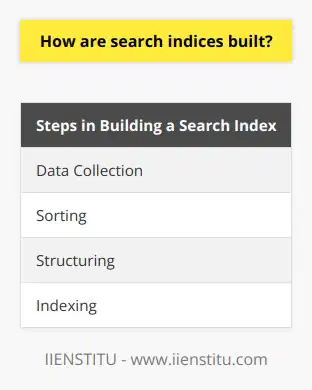
What are the challenges of search indexing?
Search indexing is a powerful tool for managing and organizing information but it has challenges. For example, one of the primary issues that arise when using search indexing is the occurrence of false results, where the information returned is inaccurate or unreliable. This can be due to various reasons, such as errors in data collection, indexing, or incorrect tags and labels.
False results can lead to wasted time and frustration as users are presented with irrelevant or misleading information. To mitigate this challenge, selecting tags and labels when indexing data is essential. Accurate, descriptive titles and brands can help ensure the information returned is relevant and reliable. Additionally, using multiple tags and labels can help increase the accuracy of results by providing more specific information about the content being indexed.
Another challenge of search indexing is information overload, where the vast amount of data available can make it challenging to find the most relevant results. This can be particularly problematic in fields with significant data, such as scientific research or business data analysis. In these cases, it's crucial to use additional search parameters to refine the results and make them more specific to the user's needs.
For example, search parameters can filter results by date range, language, geographic location, or specific keywords. By using these parameters, users can quickly narrow down the results to the most relevant information, reducing the risk of information overload and improving the accuracy and reliability of the results.
In conclusion, while search indexing can be a powerful tool for managing and organizing information, it's not without its challenges. For example, false results and information overload can make finding the most relevant information quickly and accurately tricky. However, these challenges can be mitigated by carefully selecting tags and labels and using additional search parameters, ensuring that the data returned is accurate and reliable.
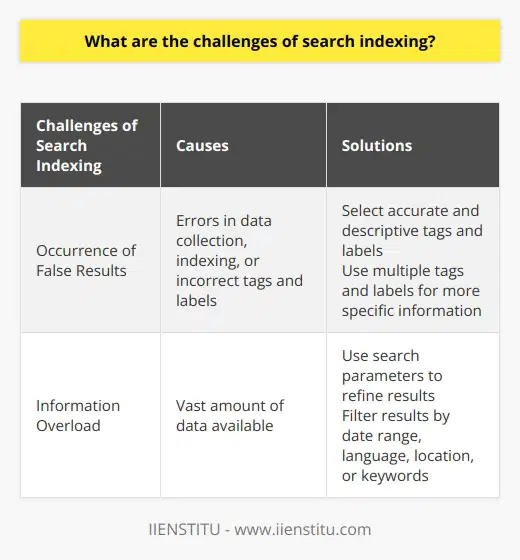
What is the role of indexing in the search performance of a database?
Role of Indexing in Database Search Performance
Improving Query Efficiency
Indexing plays a crucial role in enhancing the search performance of a database by allowing rapid access to specific data records. It functions as an organized data structure that efficiently locates and retrieves specific information within a database. Indexing is akin to the index of a book, where each index entry points to a particular page or set of pages containing the desired information. Similarly, a database index helps to identify the precise location of data in the tables, reducing the time and resources required to search for the needed information.
Optimizing Space Utilization
The efficiency of indexing largely depends on its ability to optimize the use of storage space. Indexing allows for the minimization of storage overhead and increases the availability of space for storing other essential database components. Compact and efficient index structures are essential for effective search performance, minimizing the need for multiple disk reads and reducing the overall response time of queries.
Supporting Complex Searches
Through indexing, it becomes possible to execute complex searches and queries that involve numerous search criteria or multiple database tables. In this context, indexing plays a vital role in sorting and filtering the data based on the user's specific search requirements. Various indexing techniques, such as bitmap indexing, B-trees, or hashing, support the efficient processing of complex queries and improve overall search performance.
Maintaining Data Integrity
In addition to improving search performance, indexing also contributes to maintaining data integrity in a database. Specifically, unique indexes can be used to enforce uniqueness constraints on chosen columns, ensuring that no duplicate values are present within those columns. This mechanism helps in preserving data consistency and preventing data corruption due to duplicate entries, ultimately enhancing the reliability of the database.
In conclusion, indexing is an indispensable component of an efficient database system as it accelerates the retrieval process, optimizes space utilization, supports advanced search operations, and upholds data integrity. By employing appropriate indexing strategies, database administrators can enhance the search performance of their systems and at the same time, ensure data reliability and consistency.
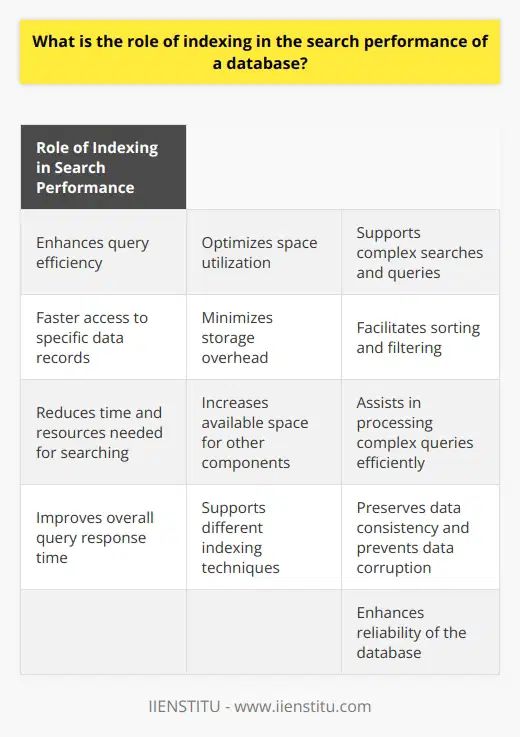
How do indexing techniques vary across different search engines and information retrieval systems?
Indexing Techniques in Search Engines
Diverse search engines and information retrieval systems employ varying methods of indexing to organize and retrieve data. Generally, they can be broadly categorized into three types: keyword-based, semantic, and hybrid indexing.
Keyword-Based Indexing
This form of indexing revolves around identifying specific words within documents, which are then used as index terms. Search engine crawlers extract these terms while gathering data from various sources, like web pages. Google, for instance, primarily employs this technique, building an inverted index of terms and their corresponding documents. Users' queries are matched against this index to retrieve relevant results.
Semantic Indexing
Semantic indexing focuses on understanding the meaning of the content instead of merely identifying keywords. This method employs natural language processing (NLP) and machine learning algorithms to recognize relationships between words and phrases, allowing for a richer understanding of context. Lycos, an early search engine, pioneered in utilizing semantic indexing to deliver meaningful query results. Nowadays, semantic indexing plays a significant role in modern search engines like Bing and Yahoo.
Hybrid Indexing
To capitalize on the advantages of both keyword and semantic indexing, some search engines utilize hybrid indexing techniques. These systems extract keywords while also analyzing the context and relationships between terms. Google has been adapting its indexing process to include semantic understanding using technologies such as the Knowledge Graph and BERT, a language model for improved natural language understanding. This combination of techniques results in enhanced search result relevance and accuracy.
In conclusion, search engines and information retrieval systems employ various indexing techniques to cater to users' diverse information needs. While some systems rely on keyword-based indexing, others utilize semantic or hybrid approaches. The continuous evolution of these techniques delivers increasingly relevant and accurate results, streamlining the information retrieval process for users.
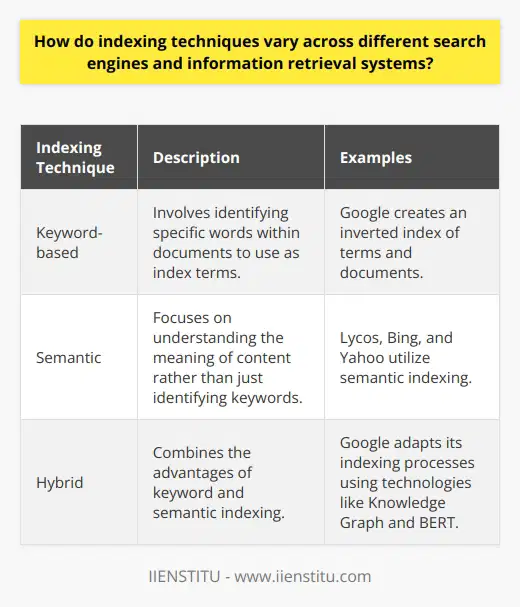
Can the absence or inefficiency of indexing have negative implications on search accuracy and usability?
Impact on Search Accuracy
Undoubtedly, the absence or inefficiency of indexing can lead to negative implications on search accuracy. Indexing serves as a key process that organizes and categorizes web content, allowing search engines to retrieve and display relevant results promptly. A poorly indexed website, therefore, will not only limit the visibility of its content but also compromise its accuracy in terms of relevance to users’ search queries.
Effect on Usability
Moreover, the consequences of inadequate indexing extend to the usability of a website, which directly affects user experience. Users typically navigate through search engines with the expectation of discovering targeted information quickly and effortlessly. A website with a faulty indexing system may generate search outcomes that are unrelated, outdated, or challenging to locate, ultimately frustrating users and prompting them to search elsewhere.
Solutions to Improve Indexing
To optimize search accuracy and usability, blog owners must recognize the significance of implementing efficient indexing processes. Several strategies can be employed:
Utilize descriptive metadata: Incorporating informative metadata, including relevant keywords, can help search engines index web content accurately and improve overall search outcomes.
Develop intuitive site navigation: Creating a well-organized and straightforward website structure ensures that search engines can effectively crawl and index web content, enhancing search accuracy.
Employ responsive design: Designing a website with a mobile-responsive layout can not only enhance user experience but also boost its indexing capabilities since search engines prioritize mobile-friendly websites.
Regularly update web content: Continuous updating and refinement of web content can help maintain relevancy, minimizing chances of search engine indexing inefficiencies.
Seek professional assistance: Lastly, seeking guidance from experts in search engine optimization can help blog owners effectively address indexing issues and improve search accuracy and usability.
In conclusion, maintaining efficient indexing processes is crucial for optimizing search accuracy and enhancing a website’s usability. Blog owners must prioritize implementing effective and reliable indexing techniques to ensure their content is readily accessible and relevant to users navigating search engines.
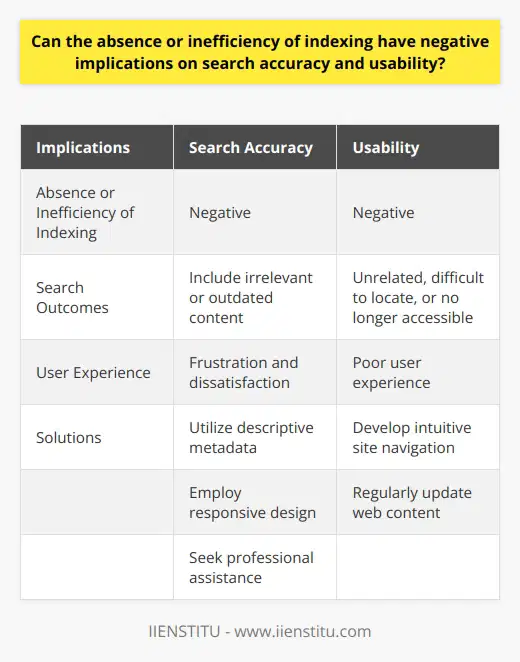
What is the relationship between indexing and query processing in searching?
Indexing and Query Processing: An Essential Relationship
In searching, indexing and query processing are interconnected processes that work in tandem to deliver relevant and precise results for users' queries. These two key functions play a critical role in enhancing the efficiency, speed, and accuracy of search operations in databases and search engines.
Role of Indexing
Indexing is the process of organizing and cataloguing data stored in a system, making it readily available for search queries. This involves creating an index, a data structure that maps keywords to their locations in databases or documents, allowing swift retrieval of information in response to specific search requests.
Benefits of Indexing
Notably, indexing boosts the search performance, as it reduces the time-consuming task of scanning every record, document, or file for relevant data. In doing so, indexing ensures faster search results and optimizes resource utilization, which is essential for handling heavy workloads in large-scale systems and databases.
Query Processing: Locating Relevant Results
Query processing, on the other hand, is the method through which a search engine or database system interprets, analyzes, and executes user queries. It entails parsing the search terms, applying algorithms, and leveraging the index to identify and retrieve the most contextually relevant data in response to the given query.
Synergy Between Indexing and Query Processing
The relationship between indexing and query processing is symbiotic, as the efficiency of query processing relies heavily on the quality and effectiveness of the index. A well-structured index significantly enhances query processing by eliminating redundant data, expediting searches, and refining the dataset accessed when responding to a query.
Furthermore, advances in indexing techniques contribute to improvements in query processing algorithms, driving progress in search technology. Together, these advancements optimize the management of vast and expanding data repositories, catering to the growing needs of users in terms of search relevance and speed.
In conclusion, the relationship between indexing and query processing is a vital aspect of searching, with indexing forming the foundation for enabling efficient query processing. Ensuring the robustness and accuracy of indexing mechanisms is crucial for delivering the most relevant search results and maintaining the overall effectiveness of search engines and databases.
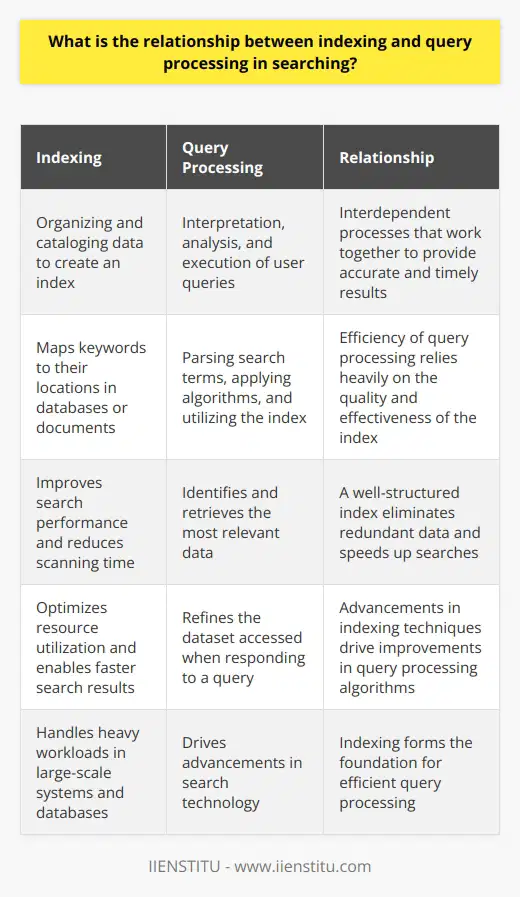
How do language differences and character sets impact the indexing process?
Impact on Indexing Process
Language differences and character sets significantly impact the indexing process due to the variety and uniqueness of languages and scripts. These challenges must be addressed to ensure a comprehensive and accurate indexing process for global content.
Multilingual Challenges
The diversity of languages poses challenges in the indexing process, predominantly in terms of tokenization, word segmentation, and vocabulary. Tokenization requires dividing text into meaningful units (tokens), which can differ greatly across languages. For example, words in English are separated by spaces, while in Chinese, there are no spaces between characters. Navigating these differences is crucial for accurate indexing in a multilingual environment.
Handling Non-Latin Scripts
Another aspect that affects indexing is the use of non-Latin scripts and character sets. Many languages, such as Chinese, Japanese, Korean, and Arabic, feature complex character sets, which pose additional challenges for indexing systems. For example, handling right-to-left scripts in Arabic, or recognizing different forms of the same character in Japanese kanji, requires specialized processing techniques. Converting these different scripts into a unified format for proper indexing is essential for search and retrieval purposes.
Character Encoding Schemes
Adopting a consistent character encoding scheme is crucial for indexing multilingual content. Unicode provides an efficient means of representing the diverse character sets used worldwide, involving over 140,000 characters from various scripts. Adopting Unicode allows indexing systems to accommodate a wide range of languages and scripts, thereby streamlining the indexing process.
Language-specific Indexing Techniques
To optimize the indexing process, language-specific indexing techniques should be employed. This includes using stemming algorithms to reduce words to their root form, thereby enhancing search relevancy. Additionally, stop word lists – which filter out commonly occurring but less meaningful words – must be customized for each language to effectively index and search content.
In conclusion, language differences and character sets add complexity to the indexing process. Addressing these challenges requires the application of specialized techniques for tokenization, character encoding, and language-specific indexing. Ensuring that indexing systems can effectively handle multilingual content is vital for providing accurate search results and ensuring global users can access the information they need.
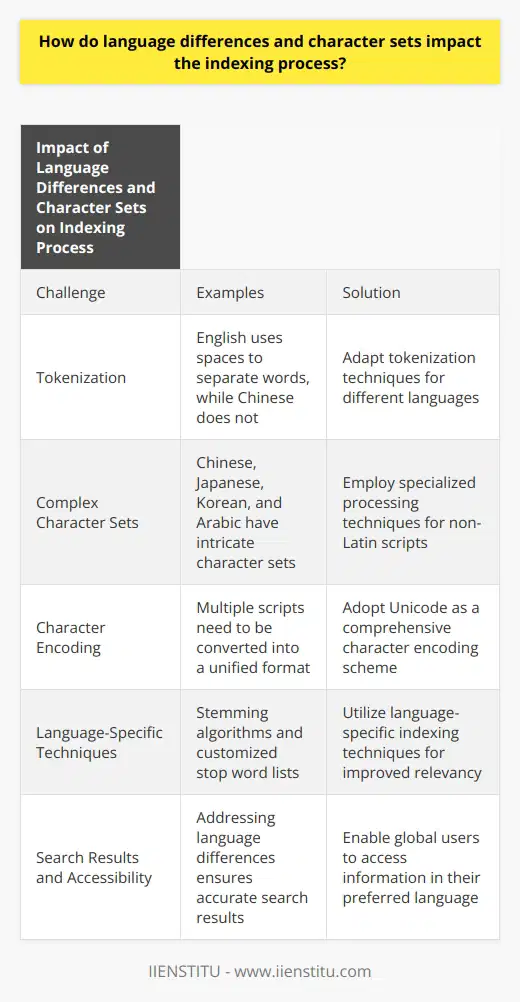
What factors determine the choice and effectiveness of a specific indexing technique during a search?
Indexing Technique Selection Factors
The choice and effectiveness of a specific indexing technique during a search are determined by multiple factors. Information retrieval systems should be designed considering the specific indexing techniques' characteristics and how they suit the particular application. Some fundamental factors include the type and structure of the information, efficiency and scalability, relevance of retrieved information, and user interaction requirements.
Type and Structure of Information
The nature of the data being indexed significantly influences the choice of indexing technique. Different indexing techniques are specialized for handling specific data types and structures, such as textual, numeric, or multimedia data. Optimal search performance depends on aligning the appropriate indexing technique with the characteristics of the data.
Efficiency and Scalability
Indexing techniques vary in terms of their efficiency in indexing and searching data. Some techniques may be suitable for small-scale applications but struggle when the volume of data increases. Therefore, selecting an indexing technique that meets performance standards and scales well with the growth of data is essential for effective search systems.
Relevance of Retrieved Information
Different indexing techniques have distinct approaches to scoring the relevance of information based on user queries. The effectiveness of search results depends on how well they match users' query intents. Therefore, the choice of an indexing technique should consider the expected fitness between the algorithm's relevance scoring and the target user's requirements.
User Interaction Requirements
Finally, indexing techniques should also serve user interaction requirements in a search system. The choice of an indexing technique must account for usability aspects such as query formulation, query modification, the presentation of search results, and error tolerance in spelling and phrasing. The more user-centric an indexing technique is, the more effective the search system will be.
In conclusion, selecting the most appropriate indexing technique during a search requires considering various factors such as the type and structure of the information, efficiency and scalability, relevance of retrieved information, and user interaction requirements. By doing so, the search system can achieve optimal performance and deliver the most relevant and useful results to the end-user.
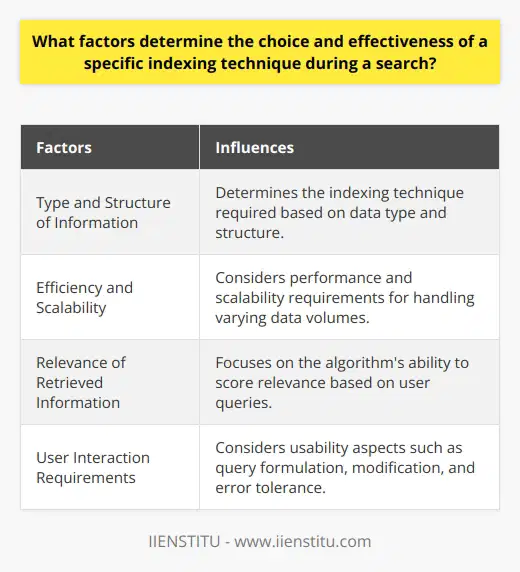
What is the role of metadata in indexing and searching?
Role of Metadata in Indexing
The role of metadata in indexing is crucial, as it creates structured data about the content to facilitate organized storage and retrieval. Essentially, metadata acts as tags that describe the characteristics and attributes of a resource, providing a systematic way for indexing services to categorize, store, and retrieve the content based on users' search queries.
Enhancing Searchability
Adding metadata to a blog post enables search engines and other indexing systems to understand and interpret the content, making it easier for users to find relevant information. Incorporating metadata in the form of keywords, descriptions, and other descriptive information helps search engines compare and rank content based on its relevance to a user's search query. Consequently, this increases the visibility of the content and improves its searchability.
Improving User Experience
An essential benefit of metadata is its ability to improve user experience by making search results more meaningful and user-friendly. For instance, the implementation of metadata in search results allows users to see a short summary of the blog post, the publishing date, and the author's name before clicking on the link. This additional information not only helps users decide if the content is relevant but also streamlines their search process.
Supporting Content Management
Metadata assists content creators and curators with content management by providing them with valuable information at a glance. Metadata can reveal insights about previous modifications, access rights, relationships between related content, and more. These metadata-based features make it easier for content managers to organize, update, and maintain the blog post, ensuring its accuracy and relevance for a longer time.
Fostering Interoperability and Integration
Finally, metadata promotes interoperability and integration by fostering a standardized method of organizing and sharing content across different platforms and applications. By adhering to common metadata standards, blog posts can be easily indexed and incorporated into other systems such as digital libraries, databases, and learning management systems. In essence, metadata enables seamless content sharing and collaboration, expanding the blog post's reach.
In conclusion, metadata's role in indexing and searching is vital as it supports a range of functions, such as searchability, user experience, content management, and interoperability. By implementing metadata in blog posts, content creators can ensure their content reaches the intended audience and remains accessible, accurate, and relevant over time.
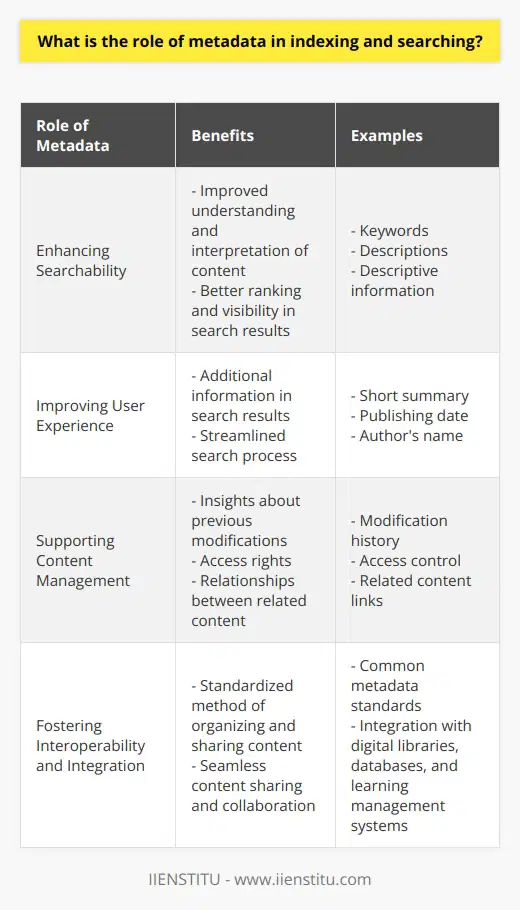
How can indexing be optimized for faster and more accurate search results?
Subheading: Keyword Optimization
To optimize indexing for faster and more accurate search results, keyword optimization plays a crucial role. Users enter specific keywords when searching for information. Therefore, creating content revolving around frequently used, relevant keywords enhances the chances of appearing in search results, ultimately providing faster and improved results for the user.
Subheading: Using Metadata
Incorporating metadata in content ensures search engines comprehend the page's content quickly, leading to better indexing. Metadata, including title tags, meta descriptions, and header tags, provides a concise summary of the content, assisting search engines in promptly gauging its relevance to user queries. Thus, adding appropriate metadata enhances search result accuracy.
Subheading: Website Structure
A well-organized website structure contributes to improved indexing by ensuring seamless navigation for search engine crawlers. Incorporating an XML sitemap and implementing hierarchical categorization can facilitate crawlers in efficiently exploring and understanding the site's content. Consequently, this results in faster indexing and accurate search results.
Subheading: Page Load Time
Optimizing page load time is crucial for enhancing indexing speed. Slow-loading pages may deter search engine crawlers from thoroughly scanning the content, leading to incomplete or inaccurate indexing. Employing techniques like image optimization, minification of CSS and JavaScript files, and using efficient hosting services can significantly reduce page load time and promote faster, more accurate indexing.
Subheading: Mobile Responsiveness
Considering the growing number of mobile users, search engines prioritize mobile-friendly content in their indexing criteria. Optimizing websites for mobile responsiveness ensures that search engines can readily index the site, improving its ranking on search results pages. Thus, mobile optimization positively impacts indexing and search result accuracy.
Subheading: Quality Backlinks
Acquiring quality backlinks from credible sources enhances a website's credibility in the eyes of search engines. This credibility boosts the site's ranking, enabling faster indexing and more accurate search results. Building a robust backlink profile by sharing valuable content and collaborating with authoritative websites is an effective way to optimize the indexing process.
In conclusion, optimizing indexing for faster and more accurate search results involves several critical factors. These include keyword optimization, metadata incorporation, a well-structured website, rapid page load times, mobile responsiveness, and quality backlinks. Together, these factors contribute to an enhanced user experience and ultimately benefit the website's search ranking.
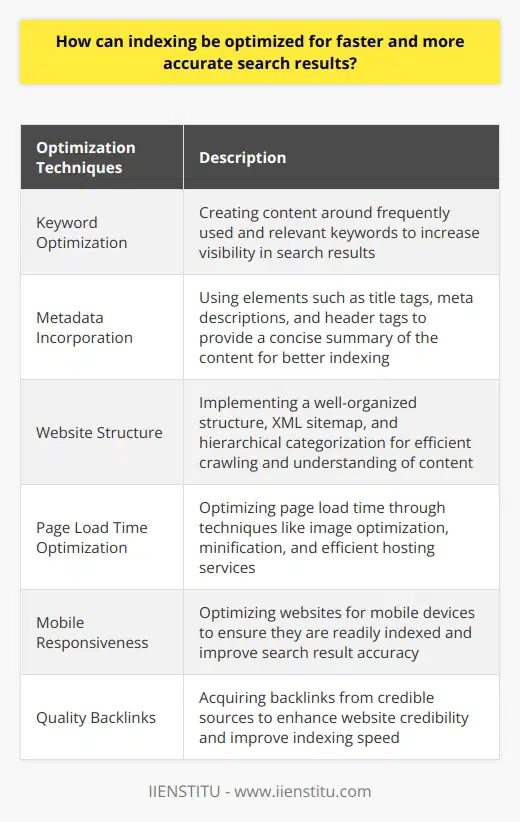
What are the ethical considerations and potential biases associated with indexing in searching?
Ethical Considerations in Indexing
One ethical consideration in indexing lies in the selective nature of the indexing process. As indexers must choose which topics, keywords, and documents to include, they face the potential risk of introducing bias into their selection. This bias can then unwittingly exclude relevant sources or marginalized perspectives from the index, thus limiting the scope of information available to searchers.
Algorithmic Bias
Moreover, the growing reliance on automated systems and algorithms for indexing poses additional ethical concerns. Algorithms can inadvertently reflect and perpetuate the biases of their programmers, such as racial, gender, or ideological bias. This can lead to biased search results that favor certain perspectives or skew the information landscape.
Transparency and Accountability
The transparency of indexing methods can also raise ethical issues. If proprietary algorithms and systems are not transparent, users cannot easily understand how the indexing of search results operates or identify potential biases. In such cases, promoting transparency and accountability in the indexing process can be important to maintaining trust and ensuring fair access to information.
Indexing and Privacy
The indexing of personal data raises concerns about privacy and potential misuse of information. As indexers collate data from various sources, they must be cognizant of the potential hazards of making personal information readily available, especially if it could be used maliciously or without the individual's consent. Index creators must balance the need for comprehensive and useful search results against the ethical obligation to protect an individual's privacy.
Inclusivity and Representation
Another important ethical consideration is ensuring inclusivity and representation within the indexing process. This means actively seeking to include diverse perspectives and sources to minimize potential biases or distortions that may arise from a more limited selection. Indexers should also engage in continuous evaluation of their methods, recognizing and addressing potential biases as they arise.
In conclusion, ethical considerations and potential biases associated with indexing in searching highlight the need for indexers to remain vigilant in their selection criteria, embrace transparency, and prioritize the inclusion of diverse perspectives. By addressing these challenges head-on, indexers can help ensure that users have access to a broad, fair, and representative range of information on any given topic.
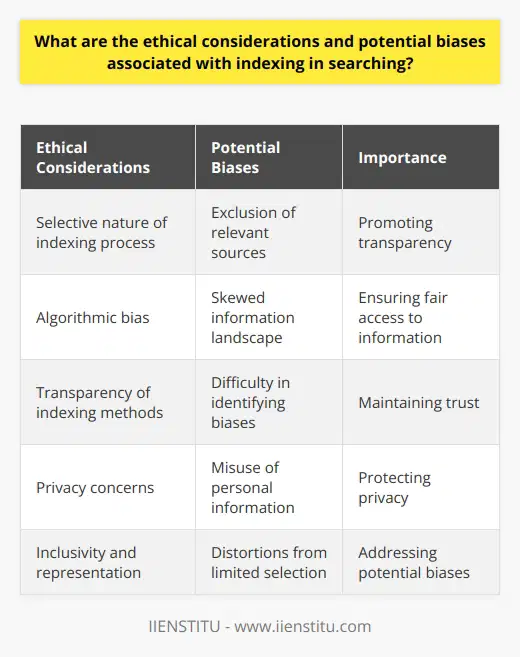
What is the impact of indexing granularity on search precision and recall?
Impact of Indexing Granularity on Search Precision
Indexing granularity plays a crucial role in determining search precision and recall, which are the key performance indicators for search engines and information retrieval systems. Granularity refers to the level of detail present in the indexing, and it has a direct bearing on the effectiveness of the search results.
Influence on Search Precision
Higher granularity levels lead to more precise search results because finer-grained indexing allows the retrieval system to differentiate documents based on very specific terms and features. In this context, precision is the proportion of relevant documents retrieved from the total number of documents fetched. A finer-grained index increases precision, minimizing instances where irrelevant documents are retrieved and clutter the search results. Therefore, indexing granularity has a positive correlation with search precision.
Impact on Search Recall
Recall, on the other hand, refers to the proportion of relevant documents retrieved compared to the total number of relevant documents in the database. The impact of indexing granularity on recall is often more complex. Higher granularity levels can improve the recall if the indexing captures the essential features of documents and allows correctly identifying relevant records. However, it can also negatively affect recall if the granularity leads to excessive fragmentation of the index, causing the search engine to overlook relevant documents due to overly specific indexing criteria.
Trade-off between Precision and Recall
In practice, there is often a trade-off between precision and recall. High granularity levels may simultaneously enhance precision while negatively impacting recall, or vice versa. Therefore, the challenge for search engines and retrieval systems is to strike the right balance between granularity levels that maximize both precision and recall for optimal search performance.
To conclude, indexing granularity has significant implications for search precision and recall. While high granularity levels generally lead to better precision, their impact on recall is more nuanced. Optimizing indexing granularity to achieve a balanced compromise between precision and recall is critical for the effectiveness of search engines and information retrieval systems.
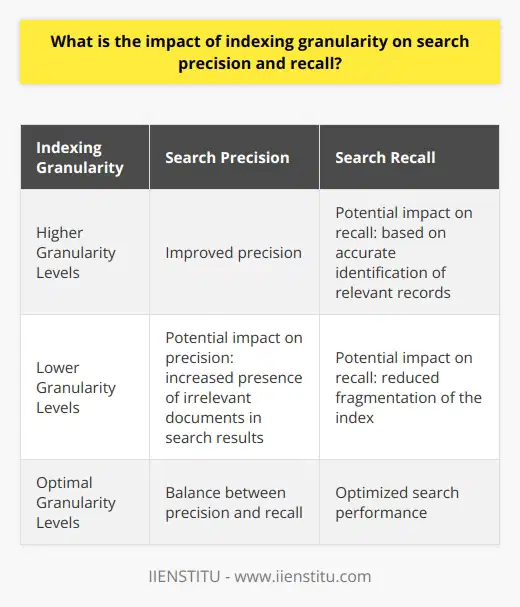
How do document length, format, and structure influence the indexing process for effective searching?
Document Length and Indexing
Document length plays a crucial role in the indexing process and impacts search efficiency. Longer documents typically contain more content, keywords, and relevant information, which can improve their indexing and increase their visibility in search results. However, excessively long documents may cause search engines to struggle in evaluating and categorizing the content, potentially leading to reduced search effectiveness.
Formatting Impact on Indexing Process
Proper formatting is essential because it enhances the readability of a document, making it easier for search engines to understand and index the content. The use of headings, subheadings, bullet points, and numbered lists helps to break down complex information into digestible and organized chunks, allowing search engines to index it effectively. Furthermore, the effective use of formatting, such as bold or italic text, also makes it easier for search engines to identify keywords and boost the relevance of the document in search results.
Structural Influence on Effective Searching
A well-structured document consists of a logical arrangement of content that ensures a smooth flow of information and facilitates search engine indexing. Effective document structure entails the use of hierarchical organization, allowing search engines to understand the content's progression and importance levels. A clear and coherent structure also enables search engines to index the document quickly, leading to increased chances of appearing in relevant search results.
In conclusion, document length, format, and structure all impact the indexing process and contribute to effective searching. Striking the right balance between these factors can significantly enhance a document's visibility and relevance in search results, leading to a higher likelihood of being accessed by users searching for related information.
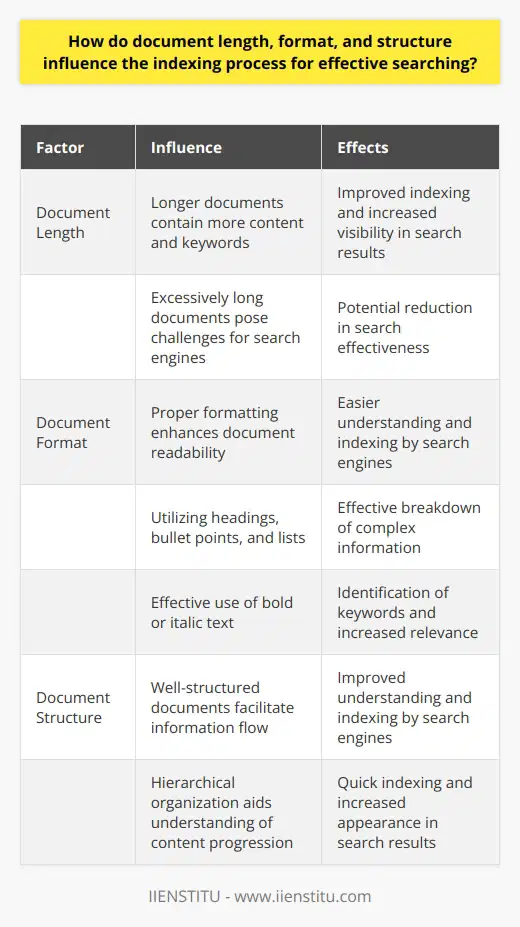
In what ways do information retrieval models incorporate indexing to enhance search algorithms and ranking mechanisms?
Indexing in Information Retrieval Models
Effective information retrieval models rely on indexing to improve search algorithms and ranking mechanisms. The indexing process involves creating an organized structure that systematically stores and maps documents for efficient search and retrieval. There are several ways in which information retrieval models use indexing to enhance their search capabilities.
Keyword-based Indexing
One common approach to indexing is based on keywords. Information retrieval models analyze the content of documents and extract meaningful keywords, which are then stored in an index. This enables the search algorithm to quickly identify and return documents containing the searched keywords, resulting in faster search times and more relevant results.
Inverted Indexing
Another widely employed indexing technique is the inverted index, whereby each term in the document collection is associated with a list of documents containing that term. Search algorithms can quickly access the list of relevant documents for a given query, enhancing the performance and accuracy of the retrieval process.
Vector Space Model
The vector space model is an indexing technique that represents documents and queries as vectors in a multidimensional space. Similarity between documents and queries is calculated based on vector distance, enabling the model to rank documents based on their relevance to the query. This approach greatly improves ranking mechanisms, as it facilitates the identification of documents that are highly related to the search query, even if they do not share an exact keyword match.
Latent Semantic Indexing
One more sophisticated indexing method is latent semantic indexing (LSI), which goes beyond simple keyword matching by identifying underlying concepts and patterns in the document collection. When indexing documents, LSI uses a mathematical technique called singular value decomposition to extract latent concepts. LSI enhances both search algorithms and ranking mechanisms by enabling the accurate retrieval of documents that are conceptually related to the query, even if they do not share any specific keywords.
In summary, information retrieval models incorporate various indexing techniques to enhance search algorithms and ranking mechanisms. These indexing methods contribute to improved search efficiency, relevance, and overall performance, enabling users to quickly find the information they are seeking.
